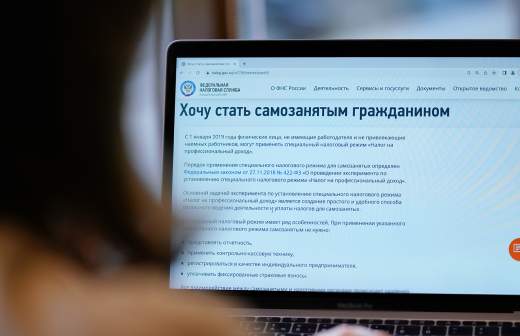- Статьи
- Economy
- Tax share: debts from individuals and the self-employed will be collected without a court of law

The Government has submitted to the State Duma a bill on amendments to the Tax Code and the law "On Enforcement Proceedings". According to the document, the Federal Tax Service will be able to collect tax debts from citizens forcibly without a court order, by displaying the amount of arrears in the personal cabinet of the taxpayer and instructing the bank to write off the money. According to the idea, this will speed up the procedure, relieve the magistrate courts, which in fact simply fix the debt, and allow to fill the budget with tax revenues more quickly. Izvestia talked to experts about the pros and cons of the initiative.
What is the debt of the Federal Tax Service and how it is written off
The need for these amendments did not arise out of thin air. According to the Judicial Department of the Supreme Court of the Russian Federation, in 2016-2023, magistrate judges each year issued up to 6 million decisions in cases involving the collection of mandatory payments or fines. At the same time, no more than 5% of the decisions were canceled. According to the CAO, in order to cancel a court order, the debtor had to send an unmotivated objection to the justice of the peace.
So far, the out-of-court mechanism has been effective only for businesses and sole proprietorships, but the government has found it expedient to extend it to individuals and the self-employed.
As noted in the explanatory note, it is proposed to collect debts on taxes, fees and insurance contributions without court, which a physical person calculates independently, for example, when submitting declarations of professional income tax.

In other cases, it is possible to write off debts before the court, only if the citizen does not object and there is no legal dispute. We are talking about more complex situations, when the tax office itself sends a notice or there was a question of granting a tax deduction, as well as in the case of a situation with tax offenses.
The press service of the Federal Tax Service emphasizes that the rights and guarantees provided by the legislation on enforcement proceedings for socially vulnerable persons are preserved.
The innovation will affect everyone as payers of personal taxes: personal income tax, transport, property or land taxes, explained a member of the expert council under the Federal Tax Service to improve the practice of application of legislation on insolvency (bankruptcy), managing partner of LLC "Alliance Partners Group" Alexander Usov.
This measure will take effect from November 1, 2025, when taxes for the use of property will be assessed in 2024.
Specialists of "ICPCN-Consultant" explain that the mechanism of extrajudicial collection of tax debts will work as follows: the tax authority sends a notice to the debtor and, if the debtor does not object within 30 days, the amount can be written off from his account. Under the new procedure, both the tax amount and penalties or fines will be collected. At the same time, the amount of arrears must be less than 3000 rubles. Otherwise, the Federal Tax Service will have to go to court.
Since last year, a single account has been operating in our country, where all property taxes are accrued. In case of delay, penalties are accrued. The tax can be challenged within 30 days, if the charge is erroneous or the amount is double-counted.
According to Alexander Usov, this happens if when selling property the taxpayer does not submit a tax return and loses the right to receive legally established deductions. And the tax authority always assesses taxes based on the information it has.
If the tax is not paid and no objections are received within 30 days, the Federal Tax Service goes to court. If the court decision is not followed by payment, the bailiffs are involved, and the person turns out to be in the register of debtors of the FSSP.
Experts have outlined the possible disadvantages of the new initiative. According to Natalia Glebova, a member of the Russian Bar Association, one of the problems may be the situation when a person learns about his debt only after the initiation of enforcement proceedings. In practice, this can happen if for some reason he did not receive a tax notification. For example, he lives in the wrong neighborhood, where he is registered, or does not have an account on "Gosuslugi".
Alexander Usov added that in fact there may be precedents with erroneous write-off, which in the process will also need to be appealed and clarified.
How to challenge a tax charge
Practice shows that after the introduction of the unified tax account (UTA) in the courts there were many cases in which citizens challenge the legality of accruals, says Counselor of the Federal Chamber of Lawyers of the Russian Federation Ekaterina Hudova.
- Unfortunately, it has to be stated that the tax authorities do not respond to all applications for debt adjustment, and we have to fight off the same charges in several circles, - the lawyer specifies.
Administrative lawsuits are filed with the courts for taxes that have been paid or the statute of limitations on which has expired.
- Just last week there was an egregious case: the tax authority appealed to the city court with two lawsuits to the debtor on one tax for the same period, while the tax was paid, - said Ekaterina Khudova.
According to her, if this measure allows to settle disputes out of court, the life of taxpayers will become easier.
However, the lawyer sees the problem in the fact that the burden of going to court with the new procedure will fall on citizens.
- As practice shows, it is impossible to prove to the tax authorities that the tax has been paid or that the statute of limitations for collection has expired. And individuals will have to file lawsuits against the Federal Tax Service to recognize tax debts as uncollectible, - insists Ekaterina Hudova.
According to Tatiana Vinokurova, deputy general director of ICPCN-Consultant, the changes will primarily affect negligent and forgetful taxpayers.
Pros and cons of the new tax initiative
According to Vadim Zasko, Dean of the Tax, Audit and Business Analysis Department of the Financial University under the Government of the Russian Federation, the construction of out-of-court settlement of tax debts proposed by the Russian government fully reflects the balance of interests of citizens and the budget. Such a conclusion can be made, since it is proposed to collect only uncontested assessments, such as property tax or personal income tax, in an indisputable manner.
However, the expert recognizes that for taxpayers the initiative has both advantages and certain disadvantages.

Among the pluses is the possibility not to build up debt and penalties. That is, the problem of one-step debt collection for several years is bought.
Among the disadvantages, according to Vadim Zasko, is the fact that late payment can be associated not only with banal forgetfulness, but also with temporary financial difficulties.
Tatyana Satskevich, Head of the Department of State, Law, Finance and Legal Disciplines of the Moscow Finance and Law University (MFLEU), assumes that out-of-court collection of debts may lead to arbitrary interpretation of existing regulations and violation of the fundamental principles established in Article 3 of the Tax Code. She does not rule out arbitrariness on the part of tax authorities.
Переведено сервисом «Яндекс Переводчик»








